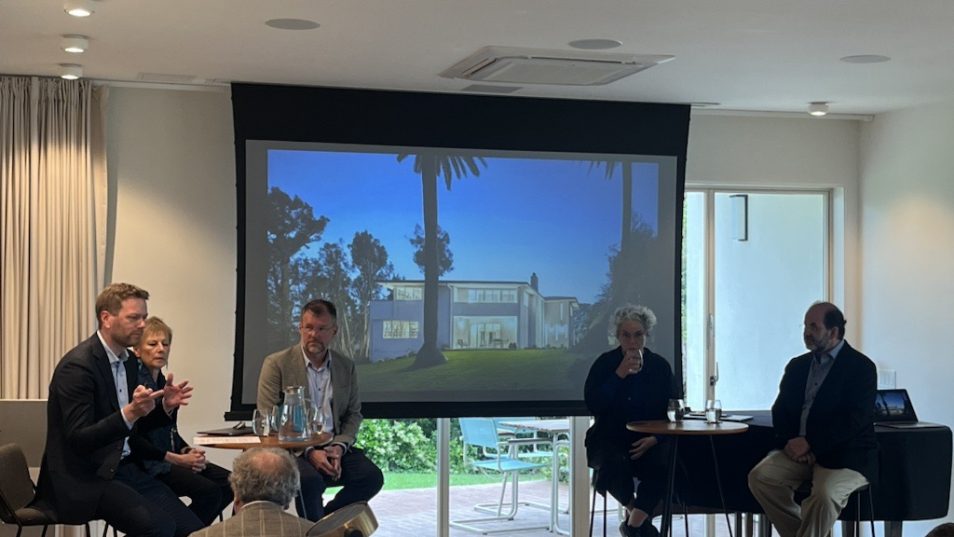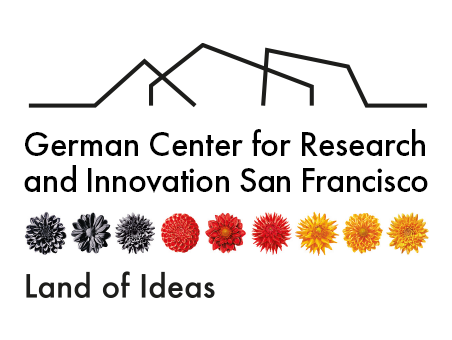Trust in Science

On Tuesday, May 24th, we spent the day at the Thomas Mann House in Los Angeles for their event: “Trust in Science in the Context of Climate Change Action.” This event brought together Professors Rebeca Méndez, Jon Krosnick, Craig Callender, and Ursula Heise, who offered interdisciplinary perspectives on how we can increase awareness of the climate crisis and call to action through messaging and art, statistics on how Americans perceive climate change, as well as pitfalls that the scientific community has faced in fostering trust in its work.
Speakers:
- Craig Callender (Professor of Philosophy and co-director of the Institute for Practical Ethics at the University of California, San Diego)
- Ursula Heise (Professor and Chair of the English Department at UCLA and Director of the Laboratory for Environmental Narrative Strategies, Institute of the Environment & Sustainability)
- Jon Krosnick (Professor of Political Science, Communication, and (by courtesy) Psychology, and director of the Political Psychology Research Group (PPRG) at Stanford University)
- Rebeca Méndez (Professor for Design Media Arts at UCLA and founder and director of the CounterForce Lab, a research and fieldwork studio for art, design and environment)
 The event began with Rebeca Méndez, a local artist and Professor of Design Media Arts at UCLA. Méndez’s research and practice investigates design and media art in public space, critical approaches to public identities and landscape, and artistic projects based on field investigation methods. Méndez presented her most recent project, The Sea Around Us, which illustrates — in a jarring way — the dumping of thousands of barrels of DDT, a banned pesticide, off the coast of Catalina Island. To create the project, Méndez commissioned an underwater cinematographer and musician to create immersive visual and sound effects, giving viewers an embodied experience of how these past environmental abuses continue to affect the ecosystem today. Méndez’s mission is clear: to raise awareness of environmental justice and foster trust in science, we must communicate these issues in creative ways to reach those who may otherwise ignore it as they go about their daily lives.
The event began with Rebeca Méndez, a local artist and Professor of Design Media Arts at UCLA. Méndez’s research and practice investigates design and media art in public space, critical approaches to public identities and landscape, and artistic projects based on field investigation methods. Méndez presented her most recent project, The Sea Around Us, which illustrates — in a jarring way — the dumping of thousands of barrels of DDT, a banned pesticide, off the coast of Catalina Island. To create the project, Méndez commissioned an underwater cinematographer and musician to create immersive visual and sound effects, giving viewers an embodied experience of how these past environmental abuses continue to affect the ecosystem today. Méndez’s mission is clear: to raise awareness of environmental justice and foster trust in science, we must communicate these issues in creative ways to reach those who may otherwise ignore it as they go about their daily lives.
Following Méndez’s presentation, we listened to Jon Krosnick, Professor of Communication, Political Science, and Psychology who runs the Political Psychology Research Group at Stanford University. Krosnick is a social psychologist who researches attitude formation, change, and effects, the psychology of political behavior, and survey research methods. He noted that during the last 50 years of serious survey research, the American public has been about equally divided on many important and controversial issues of public policy. But global warming is unusual – twenty years of surveys show that strikingly large majorities of Americans have agreed about whether global warming has been happening, whether it is a threat, whether it merits government attention, what policy approaches are appealing, and what policy approaches should be avoided. Krosnick’s presentation provided a quantitative lens to the issue of trust in science; he noted that professors and scientists are among the most trusted and respected professions in American society and that existence of climate change is not particularly controversial. Yet political hijacking of these issues and scare-tactics aimed at polarizing the public have unfortunately stymied any substantive policy action.
Ursula Heise, Professor of English at UCLA, was the next speaker. She examined the narratives that we see regarding extinction of species (such as polar bears) due to climate change and challenged the cultural frameworks shaping these narratives and images. Clearly, understanding these stories and symbols is indispensable for any effective advocacy on behalf of endangered species. Heise offered the example of polar bears, which became a poignant symbol of climate change after decades of heavy marketing. This marketing campaign, along with increased research activities in the Artic, have bred resentment among the local Inuit communities. Specifically, they view scientists as an imperious body that has collared and tagged the bears, driving them closer to Inuit communities in search of food, and challenging the way that traditional communities hunt and manage the polar bear population. By offering the example the Inuit resentment towards scientists, Heise argued that in order to foster trust in science, better communication and awareness towards traditional histories, cultures, and indigenous values is needed.
Finally, Craig Callender, Professor of Philosophy and Co-director of the Institute for Practical Ethics at the University of California, San Diego, argued in his presentation that as attention to climate change has grown, universities have taken more activist stances by declaring climate emergencies, divesting their financial assets in fossil fuel, and pledging to meet ambitious climate goals. At the same time, however, these institutions accept hundreds of millions of dollars from the fossil-fuel industry. Ironically, many of the scientists and scholars tasked with helping us find “solutions” the climate crisis are funded by companies actively working to undermine climate action. Furthermore, Callender argued that efforts to increase conflict-of-interest disclosures have been stymied by concerns of lack of funding and academic freedom and cuts to the state higher education budget have forced academics to turn to complicit companies for funding. Unfortunately, conflicts-of-interest undermine the integrity of research and trust in science unless there is political will to increase public funding to academia.
The event concluded with an insightful Q&A session with around forty audience members. With the effects of climate change becoming more pronounced, the possibility that the public succumbs to the polarization of science is worrying. Thus, science represents an ever more important anchor in how facts are perceived in the context of this dynamic between trust and mistrust.
Thank you to German Consulate General San Francisco, German Consulate General Los Angeles, German Embassy Washington DC, and Villa Aurora & Thomas Mann House e.V. for bringing us together.

